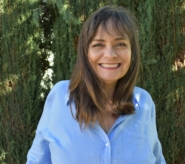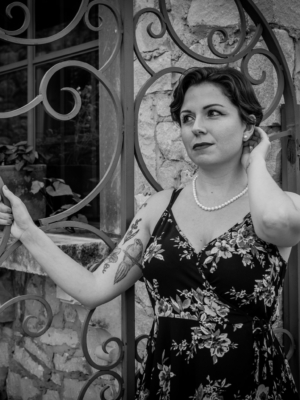Litdish: Some Kind of Beauty in the World: 6 Questions for Anna Scotti
 Anna Scotti was awarded the first ever Lightscatter Prize for her collection of poetry, Bewildered by All This Broken Sky, which will be released in the spring. Anna’s poetry can be found in a variety of literary magazines and has appeared in the New Yorker since 2016. Anna earned her MFA at AULA in 2007. Her poem “Tanager” was reprinted in the Lunch Ticket Special celebrating the 20th anniversary of the Antioch MFA program, after being awarded both the Pocataligo Prize and the Mark Fischer Prize.
Anna Scotti was awarded the first ever Lightscatter Prize for her collection of poetry, Bewildered by All This Broken Sky, which will be released in the spring. Anna’s poetry can be found in a variety of literary magazines and has appeared in the New Yorker since 2016. Anna earned her MFA at AULA in 2007. Her poem “Tanager” was reprinted in the Lunch Ticket Special celebrating the 20th anniversary of the Antioch MFA program, after being awarded both the Pocataligo Prize and the Mark Fischer Prize.
Anna Scotti’s experience as a middle school teacher informs both her poetry and her prose. Her young adult novel, Big and Bad, was released earlier this year, and her short stories are regulars in Ellery Queen Mystery Magazine. Read more about Anna at www.annakscotti.com, and find her on Instagram @annakscotti.
In what has now become typical practice in quarantine, a zoom room was the meeting place for my interview with Anna Scotti. Ironically, this enabled us to become more relaxed with one another, as if we were sitting down to meet in a living room, a place for gathering comfortably and intimately. We spoke easily and naturally about her writing process and her books. Anna Scotti is the author of the young adult novel Big and Bad, second-place winner of the Texas Review Press Novella Contest, and the author of the forthcoming poetry collection Bewildered by All This Broken Sky, which received the 2020 LightScatter Press Prize.
1. I haven’t, as far as I can remember, heard about somebody working in both fiction and poetry. Do you think your fiction background influences your writing in poetry, and if so, how?
Anna Scotti: There’s constant play back and forth. [My] interdisciplinary experience there really prepared me for the work I’m doing now. I am a teacher, but before that, I was a journalist. I use one thread of work to feed the other, but maybe not in the way in which you asked the question, maybe more as a refresher. Like when I’m stuck on a poem, and I’m trying to think in this lofty way, and I just can’t make it happen, maybe I’ll sit down and write a chapter of a story that I hope is equally good in a different way. If I’m frustrated with a poem, I’ll kill an editor in one of my suspense stories or something.
2. When you write poetry, who is the speaker of your poems? Is it you? Is it someone fictional?
AS: Lisa Bickmore, who’s a poet and a publisher, gave me this assignment to look at my entire manuscript and do all these different things that are interesting and hard. She said, “This process will lead you to questions,” and one of the questions that it led me to was exactly what you just asked me: about the “you” in a poem.
The “you” in a poem can be “I.” It can be “you.” I can literally be speaking to someone, direct address, or it can be “you” in the sense that American speakers use it to mean: “one does this” and “you do this.” Or it can be what it often is—and here’s what I think is at the heart of your question—it can be a combination. Because when I say, “You do this” in a poem, I might be referring to something that literally happened to me, or it might be something that happened to you that you told me about, or it might be a hybrid of those two experiences.
In fiction, we take things from our own lives and things we hear, and we fictionalize them, and we make them up, and we appropriate them for our own, but somehow I think there’s this feeling with poets sometimes that that’s dishonest when done in a poem, and I don’t think it is. I think to give it that emotional truth, sometimes the literal truth won’t work in a poem and you have to adjust it.
“You” is a way to hide sometimes. It’s a way to write about something that’s too painful to say “I” about, and so you say “you,” and I don’t think that’s a bad thing necessarily because I think when we say “you” in a poem, it can create an immediacy and bring the reader or the listener in[to] what we’re saying. When someone says “you,” you kind of perk up, like, “Oh, they’re talking to me.”
3. I wanted to talk about some things that the judge Katharine Coles said about your book, [Bewildered by All This Broken Sky]. She said it’s “suffused with doubt with faith, memory and its mysteries” and that the poems are “amused with themselves […] even in their grief.” How do you feel about these words written about your collection?
AS: How I feel about it is: so honored because I really admire her poetry and see some similarities between my style and her style, and so it’s quite an honor to have her say that. I also felt like Katherine Cole recognized that some of my poems are funny. [My poems] tend to be a lot about death and dying and heartbreak and loss and grief, and you might think there’s not a lot of room in [my collection] for humor, but I have intended for there to be some.
Lisa Bickmore, who is just—I can already tell—going to be the best editor in the world, was saying that in later collections, usually, the poet learns to see the whole collection as a poem itself or as a message of some kind or as something that she wants to express in addition to the individual poems—sort of the sum of its parts being greater than the whole. [After] looking at all of the poems [in my collection, I asked myself], “What is it that I want someone to get out of this?”
What I want them to see is my whole life. Most of the [poems] are autobiographical, and they range from childhood to now, middle-aged, and I want people to get an idea of my sense of what is beautiful. [I want them] to see things that I think are beautiful in these small moments. Because even though many or most of the poems are about loss, I want people to see what we’re losing when we experience loss: It’s the beauty of life or the beauty of a relationship or some kind of beauty in the world.
4. What has it been like to navigate the publishing world during a pandemic?
AS: It has been so terrible. My book was scheduled to be released on April 1st. Texas Review Press had set up some readings for me, and I have a friend in New Jersey who had set up a whole series of things in libraries and schools for me to do. I was going back to Washington DC, where I’m from, to do readings.
This was before a lot of people died of COVID, and it was before I knew anyone who had it—I know of quite a few people now, a few people who have recovered and a couple who have died. And amidst all those tragedies, there are the small daily losses: My readings were canceled, and all my signings were canceled.
Canceled, canceled, canceled, canceled, canceled.
5. Let’s talk about Big and Bad, your first young adult novel. What was your process like?
AS: [Big and Bad] has two voices in it: One is Candy, who’s 16, and she has dropped out of school, but nobody really knows that she’s dropped out. Nobody really notices. And the other thread is a dog named Bear. He’s a big dog, and he’s lost at one point, and he ends up in a dogfighting ring. [Dogfighting is] illegal everywhere in the United States, all states, but the laws against dogfighting aren’t enforced everywhere. It’s pretty big business in some places, and it’s horrific.
6. How did you go about submitting Big and Bad [for publication]?
AS: I wrote Big and Bad fifteen years ago. At that time, it had a different title; it was Big and Bad and How I Got My Life! Back because “Big and Bad” is the dog—at one point, he’s being called “Big and Bad”—and then Candy’s part was “How I Got My Life Back.” I was teaching school at the time and working on that MFA, and I didn’t really know how to go about selling a book once I’d written it. I sent it to a couple of places.
I wrote, “Would you read my book?”
“No.”
“OK,” and I put it in a drawer, and two years ago, I saw this ad for a competition by the Texas Review Press for the Clay Reynolds Novella Prize.
I was like, “I think my book is a novella, but I’m not sure because, even though I’m an English teacher, I don’t really know what a novella is.” So, I researched it, and their definition was 40,000 words or fewer, and I did a word count, and my book was 40,001 words.
So, I was like, “I can submit this book if I can cut one word!” And actually, I ended up doing a major re-write because I had written the book thirteen years previously, and I remember sitting around in my classroom, reading parts of it to my students, and they would read me some of their writing, and we had this groovy lunchtime writer’s thing happening. At the time, it didn’t seem weird that all the other writers in the group were in fifth grade because they were my students, and they were real writers! One of them publishes in Ellery Queen with me now!
I did have to update parts of the book, but I brushed it off, and I sent it in to this contest, and it didn’t win. It came in second place. But the company, Texas Review Press, asked if they could publish it, and I was like, “Yeah!” Writers read a lot about how discouraging [publishing] is, and about how you have to keep trying, but it’s really true.
Amanda Woodard is a freelance poet, essayist, and ghostwriter, and an MFA candidate at Antioch University. She studied Social Science and Journalism at the University of North Texas and attended writing workshops at the Mayborn Literary Nonfiction Conference and Writing Workshops Dallas. Her work has been performed in Oral Fixation and published in Ten Spurs, eris & eros, and FlashFlood.





